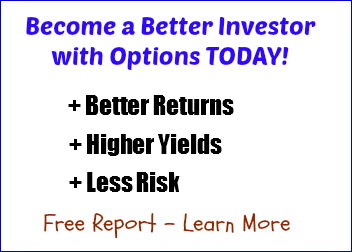What is Investing?
What is investing?
In terms of the stock market and publicly traded companies, this may seem a silly question. After all, as everyone knows, investing is putting your money into stocks, bonds, mutual funds, index funds, ETFs, etc. Right?
Wrong.
The questions that go without saying, the questions where the answers are so simple and undisputed, the questions we've essentially stopped asking ourselves, are often the very questions we most need to explore and ask anew.
What is investing? is one of those questions.
What Investing Is Not
Perhaps the best way to get at the question, What is investing? is to begin listing what investing is not:
- Investing is not generic financial activity
- Investing is not gambling
- Investing is not blind, random, or arbitrary
- Investing isn't about "playing" a trend, "exposure" to a sector, or "diversification" for diversification's sake
I've dealt elsewhere about the differences between investing and trading (i.e. gambling), so I'll focus here about the difference between investing and what the managed money industry has largely convinced most people investing is.
I'm not trying to be cynical or controversial, but just about every piece of conventional wisdom you've heard regarding long term conservative investing is probably wrong.
Why?
Put simply, mass communication is designed to appeal to a mass audience in order to generate maximum advertising revenue for the mass communicator. And, when it comes to general investing, that message has to appeal to the majority of people, most of whom spend approximately 3 1/2 minutes a week thinking about investing.
And the sponsors of the message? No surprise - the very industry looking to manage or "invest" the mostly uninterested crowd's savings.
Result? A dumbed down message full of trite cliches: "Max out your 401K and other retirement accounts in a basket of diversified mutual funds that include an appropriate mix of equities and fixed income investments based on your age and expected retirement date."
Blah, blah, blah - that isn't investing, that's an elaborate tax-advantaged savings account. If the ins and outs of true self-directed investing has absolutely no appeal to you, then this traditional and highly passive approach might be your best choice.
It's nothing personal, and I'm not trying to be ugly, but this is the choice for those without the interest or aptitude (but mostly interest) to invest for real.
It's like anything else in life. If you're willing to learn and grow and immerse yourself and gain your own insights on a subject, you can excel long term in that area and separate yourself from the crowd.
Life is about choices and priorities. You can't be brilliant in every area of life, but I believe that you can be brilliant, if you really want to, in any area of life.
In short, becoming a successful self directed investor is a choice.
Profits vs. Gains
So what is investing then?
If you really want to understand the difference between what I consider true investing and what the mutual fund industry and mass media labels investing, you must recognize the crucial difference between investing for profit and investing for gain.
Investing for profit means that your future earnings and success is derived from the operations of an actual business or business venture. The more successful the business is, the more successful you are. In the long term, both your income stream (dividends) and your net worth (stock value) will increase to the degree that the underlying business increases its profits.
(You don't technically have to a dividend stock investor in order to be an investor, but it helps.)
The powerful advantage of investing for profit is that your (increasing) returns require zero effort on your part and occur automatically.
Investing for gain, on the other hand, divorces itself at every turn from the operations of the underlying "investment." It seeks to "turn a profit" not from the actual profits of the business but rather from the timely purchase or sale of that "investment."
When you "invest" in mutual funds, you generally have two choices. You can buy an index fund (or an ETF in a brokerage account) which attempts to mirror the stock market's performance (or at least a certain segment or sector) based on its present valuation at any given time.
That's a wide, undiscriminating net you've just cast. You're bound to own small pieces of some very good companies that way. Unfortunately, you'll never reap the full benefits because your results will be diluted by the all the other pieces of mediocre and even inferior companies that you also own.
Or you can "invest" in an actively managed fund run by someone who, let's face it, spends the majority of his or her time attempting to time the market with a whole lot of other people's money.
No matter how conservative you think you are, no matter how long term of an investor you tell yourself that you are, if you simply give your money to someone else to manage, someone whose job security is based upon quarterly performance, someone who simply has way too much money to manage to ever outperform the market, you're likely a full-fledged trader and speculator without even realizing it.
Lemons and Lemonade Stands
Finally, think of it this way:
If you own and operate your own lemonade stand, you're an entrepreneur. If you own the lemonade stand but lease it to someone else or allow them to use it in exchange for a percentage of the profits, you're an investor. And if you do neither but make bets about the future price of lemons, you're a speculator or trader.
What is investing then? Investing is investing.
Tweet
Follow @LeveragedInvest

>> The Complete Guide to Selling Puts (Best Put Selling Resource on the Web)
>> Constructing Multiple Lines of Defense Into Your Put Selling Trades (How to Safely Sell Options for High Yield Income in Any Market Environment)
Option Trading and Duration Series
Part 1 >> Best Durations When Buying or Selling Options (Updated Article)
Part 2 >> The Sweet Spot Expiration Date When Selling Options
Part 3 >> Pros and Cons of Selling Weekly Options
>> Comprehensive Guide to Selling Puts on Margin
Selling Puts and Earnings Series
>> Why Bear Markets Don't Matter When You Own a Great Business (Updated Article)
Part 1 >> Selling Puts Into Earnings
Part 2 >> How to Use Earnings to Manage and Repair a Short Put Trade
Part 3 >> Selling Puts and the Earnings Calendar (Weird but Important Tip)
Mastering the Psychology of the Stock Market Series
Part 1 >> Myth of Efficient Market Hypothesis
Part 2 >> Myth of Smart Money
Part 3 >> Psychology of Secular Bull and Bear Markets
Part 4 >> How to Know When a Stock Bubble is About to Pop



